Submitted by WA Contents
Francisco Pardo Arquitecto designs underground home immersed in the Mexican forest
Mexico Architecture News - Nov 24, 2021 - 18:51 5993 views

An underground home conceived as a weekend retreat is designed for a young couple and their child to escape the bustle of urban life in a Mexican forest, located a mere two hours from Mexico City, in the rural lake area of Valle del Bravo.
Named Avocado House, the 442-square-metre building, designed by Mexican architecture studio Francisco Pardo Arquitecto, offering mesmerizing views towards the forest and allows the client to intact with the existing avocado field.
Situated on a luxuriant three-hectare site, nestled in a valley between the mountains, the area is covered by an avocado field that slopes down into a dense forest and glen.

Image © Sandra Pereznieto
From the top view, the house creates a fifth façade that promotes the landscapes and is perceived as a half-cut roof.
"The main goal was to guarantee a privileged view of the forest, but at the same time, the client also wanted to leave the avocado field intact, which inspired us to literally bury the house," said Francisco Pardo, founder of the firm.
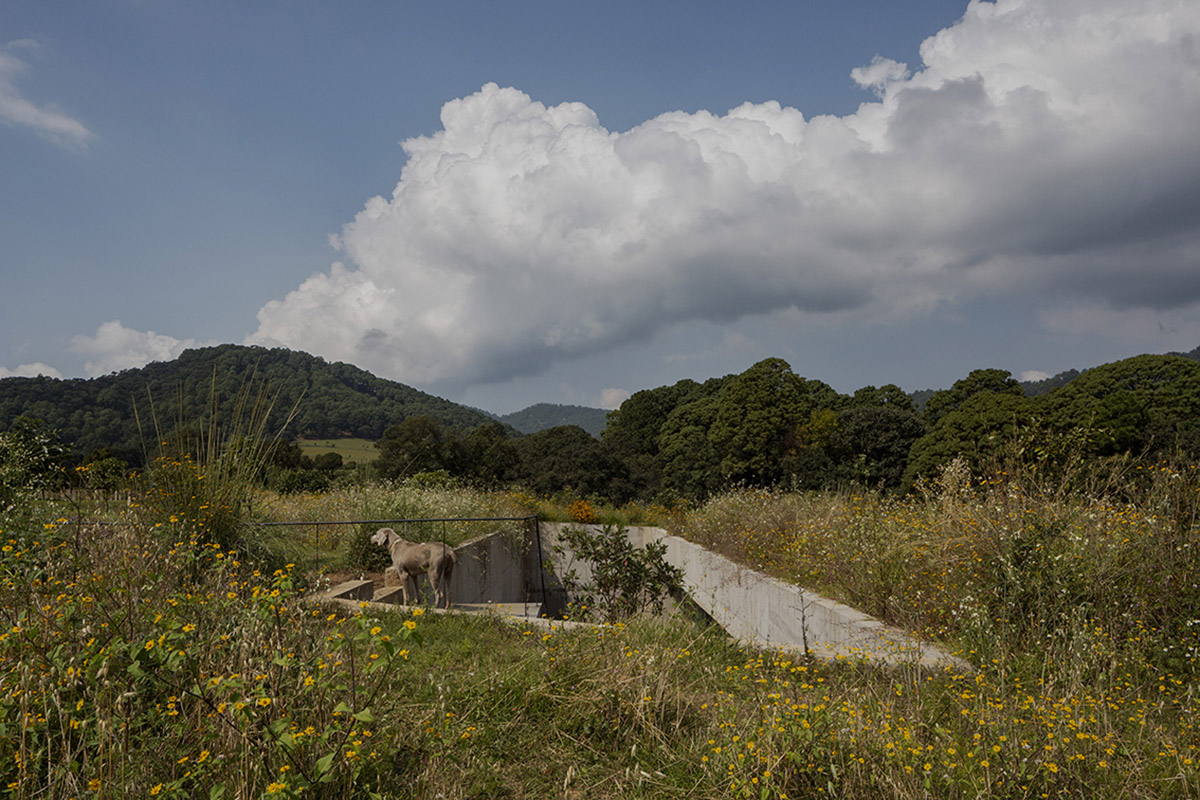
Image © Sandra Pereznieto
The architect's aim was to preserve the natural elements and generate minimum impact on the surroundings.
As a result, avocado trees sprout above the concealed and unassuming structure, which overlooks the treetops of the forest.
As keen hang gliders, the couple had a special interest in what they deemed the “fifth façade” — the view from the sky, which is designed as meticulously as its counterparts, to help the house naturally blend into the context.

Image © Sandra Pereznieto
The rear garden is accessed through a staircase which is also hidden and presents a deep structure in the landscape.
Embedding the house into the landscape also provides optimal internal thermal conditions, in an area affected by considerable temperature variation between night and day, thanks to the earth above the roof that keeps the house at a constantly mild temperature.
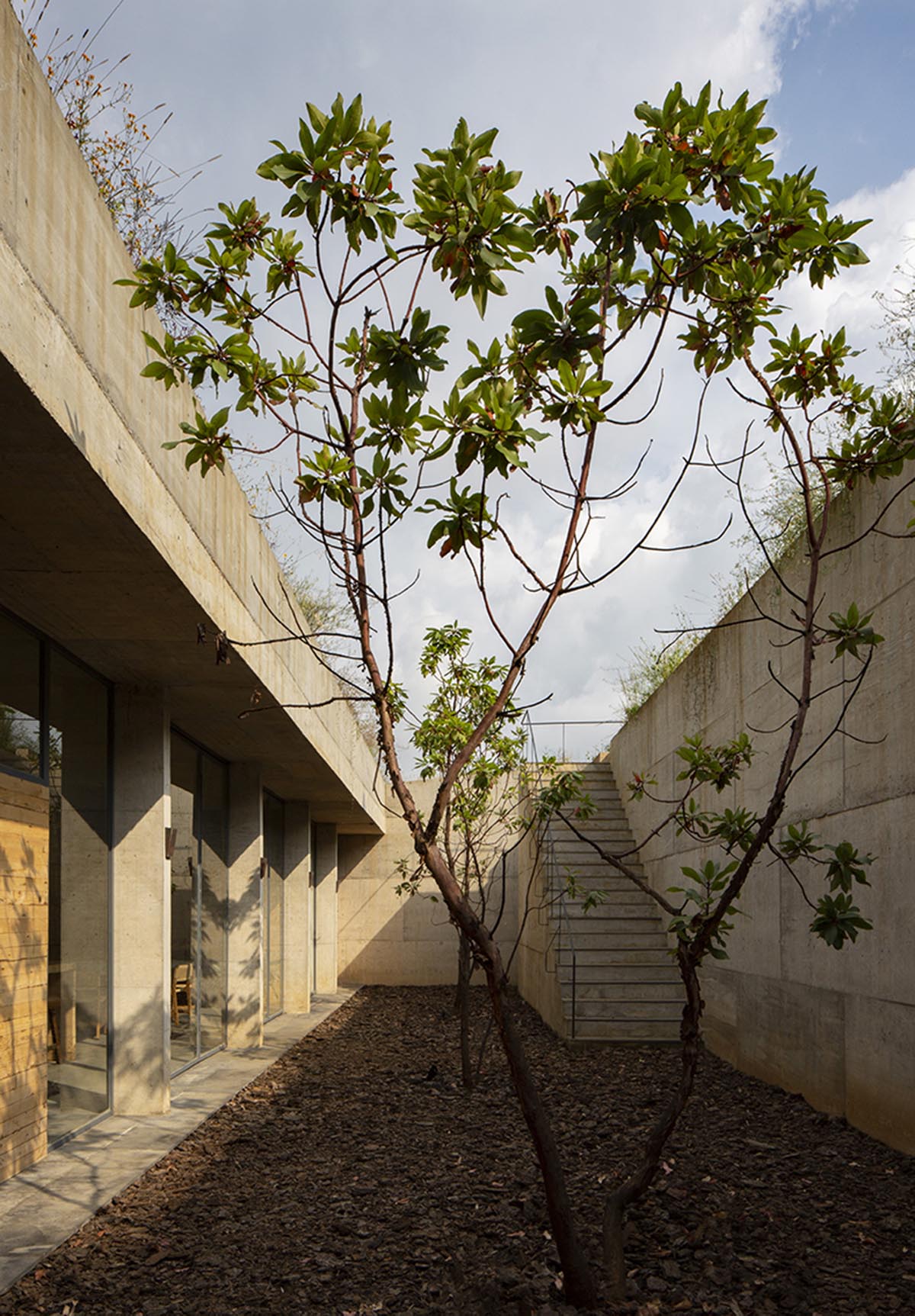
Image © Sandra Pereznieto
The internal layout, envisioned as a sunken volume, is kept as simple as possible unfolding it as a large exposed concrete container.
For this reason, the studio uses the limited number of partition walls, while keeping them isolated from the roof in order to create a continuous concrete ceiling running through the whole plan.

Image © Sandra Pereznieto

Image © Sandra Pereznieto
At the front side of the house, all common spaces, such as a kitchen, dining room, and living room, are placed where the homeowners can enjoy a terrace with a hot tub facing the forest.
The studio also uses a few custom designed elements such as the kitchen island and the impressive black metal fireplace punctuating the space.

Image © Diego Padilla
A master bedroom, the kid’s bedroom, two additional guest rooms and a studio are accommodated around this space, completing the plan.

Image © Sandra Pereznieto
The back area was pierced to become an interior patio, providing a second source of sunlight and ventilation, as well as a juxtaposition of natural elements.

Image © Sandra Pereznieto
On one side, the house enjoys a view of untamed greenery; on the opposite, a refined landscape. Thus, the project represents a subtle expression of architecture’s ability to control and coexist in creative tension with its natural surroundings.

Image © Diego Padilla
Inside, the studio uses a simple tone and texture palette creating an overall natural feel, while the material selection contributes to the minimal aesthetic and ensures very low maintenance considering the property’s function as a weekend home.

Image © Diego Padilla
The bare concrete structure combines with walls coated in Chukum, a natural stucco from the Yucatan region, and partitions made of pine wood recycled from the falsework of the construction process.
An equally sustainably-sourced cabin serves as a storage room or lookout point, boasting panoramic views of the surroundings, built above the house in leftover wood from the casting.

Image © Diego Padilla
Naturally adapting to the site, Casa Aguacates by Francisco Pardo is the vivid expression of the symbiosis between architecture and nature, wildness and domesticity.

Image © Diego Padilla

Image © Sandra Pereznieto

Image © Diego Padilla

Image © Diego Padilla

Image © Sandra Pereznieto

Image © Sandra Pereznieto

Image © Diego Padilla

Image © Sandra Pereznieto

Image © Sandra Pereznieto

Image © Sandra Pereznieto

Image © Sandra Pereznieto

Image © Sandra Pereznieto

Site plan
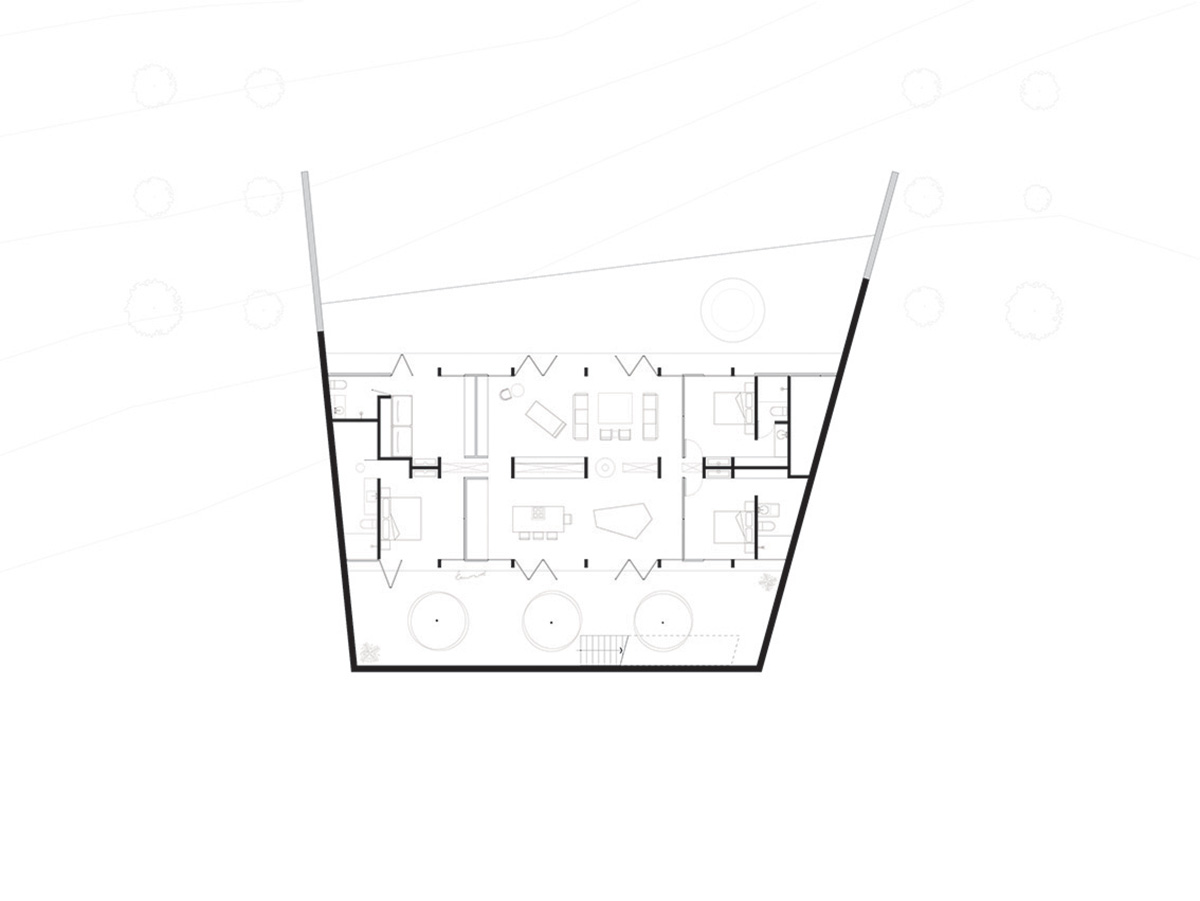
Floor plan

Roof plan

Section
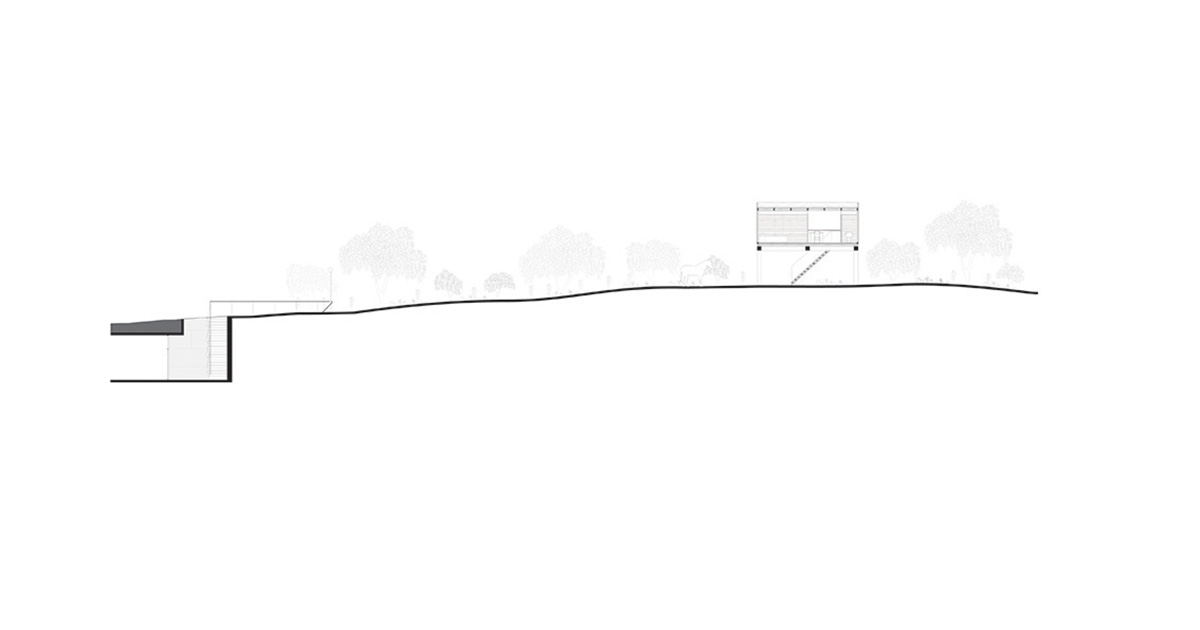
Section
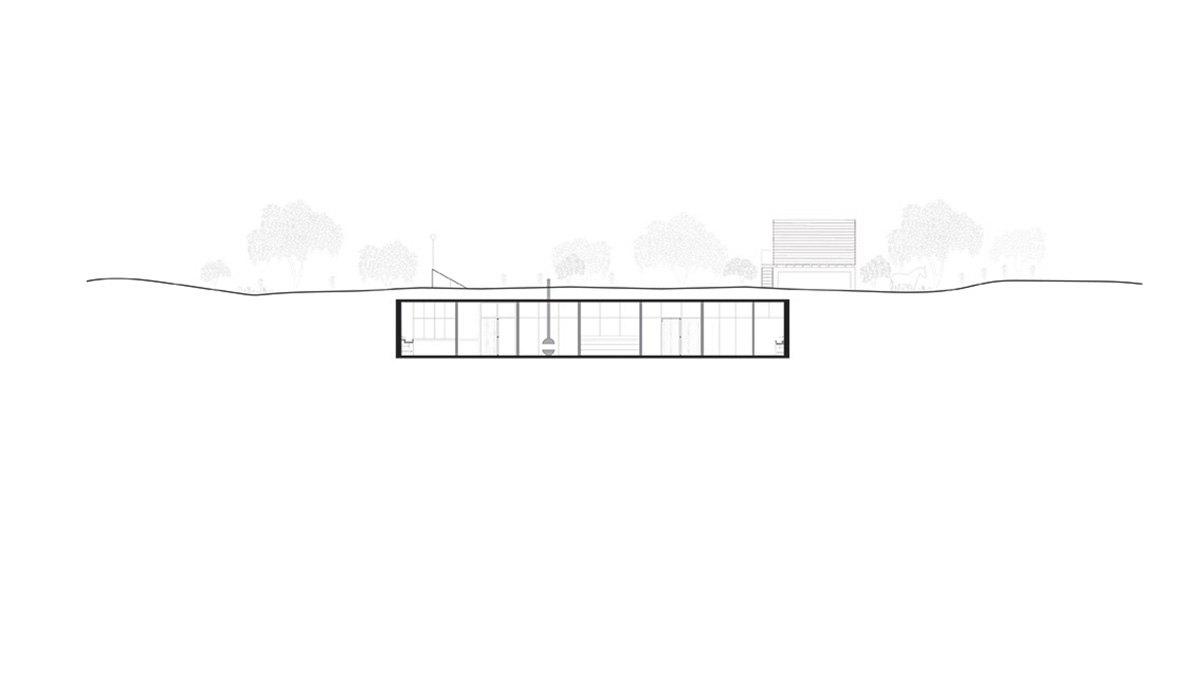
Section

Axonometric drawing
The studio previously completed a housing that features circular pool overlooking the coastal landscape in Mexico. The firm also developed Apan Prototype for self-built social housing in rural Mexico.
Project facts
Project name: Casa Aguacates — Avocado House
Location: Valle de Bravo (Mexico)
Architect: Francisco Pardo Arquitecto
Project team: Francisco Pardo Wilfrido Estrada, Karen Burkart, Rosa Medrano, Catalina Lombardo, Joanne Elliott, Nayeli Mendez, Ivan Saucedo, Julián Román Ramirez, Renato Torres
Structural engineering: Luis David Moctezuma
Electrical installations: Alejandro Moctezuma, Banah de México
Client: Private
Completion: 2021
GFA:
246 sqm (interiors)
86 sqm (outdoor)
110 sqm (roof garden)
Suppliers:
Wall finishing: Chukum
Lighting: LUZ DESIGN, Saul Bonilla
Furniture: La Metropolitana
Top image © Sandra Pereznieto
All images © Sandra Pereznieto and Diego Padilla
All drawings © Francisco Pardo Arquitecto
